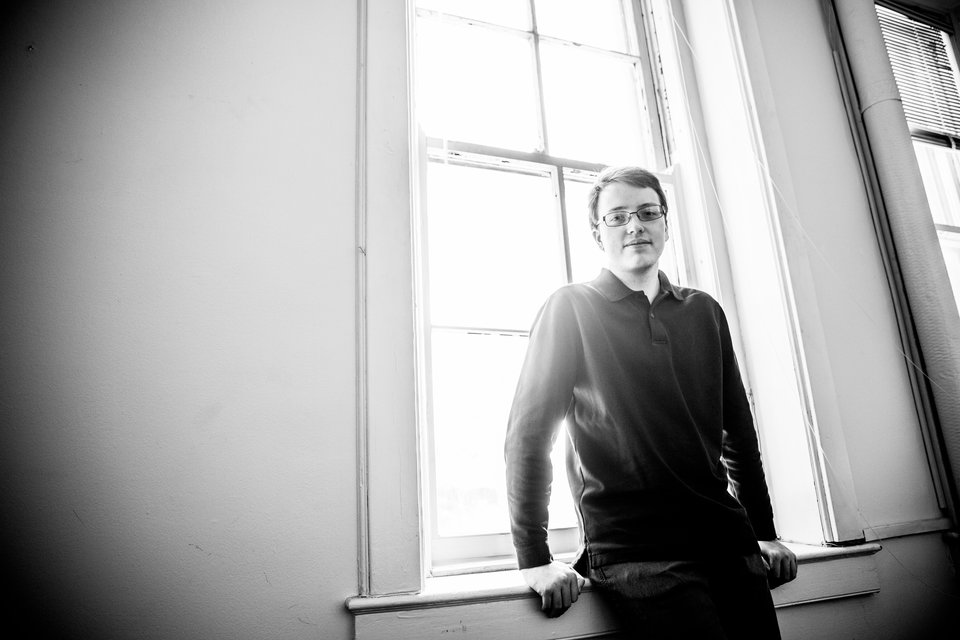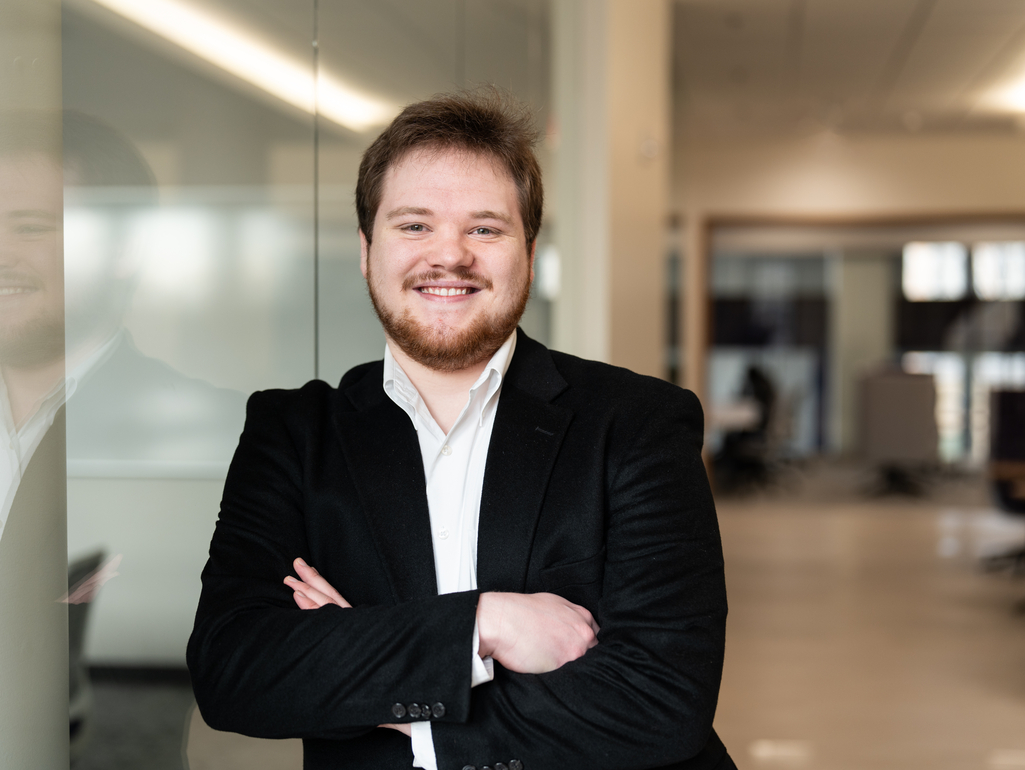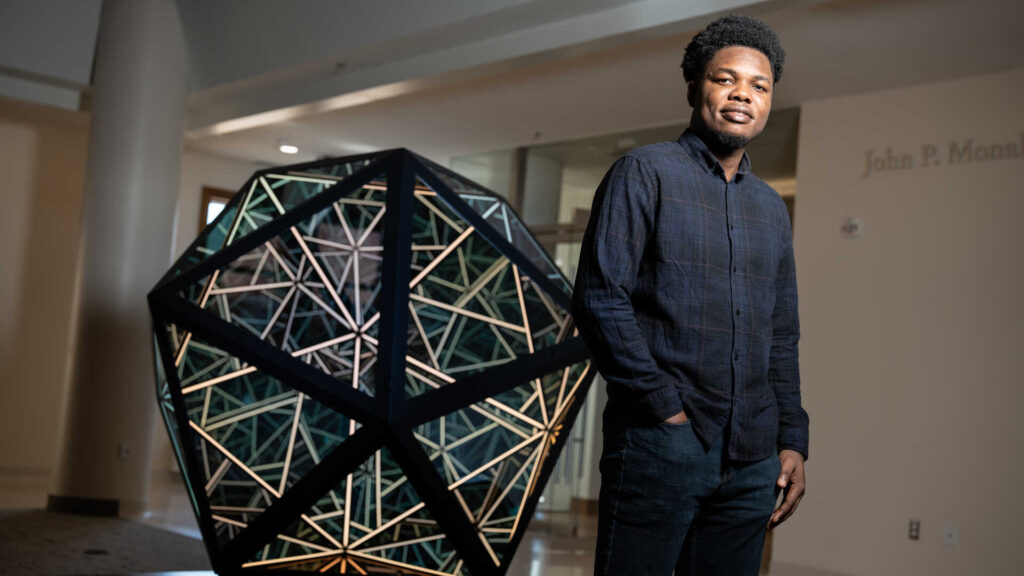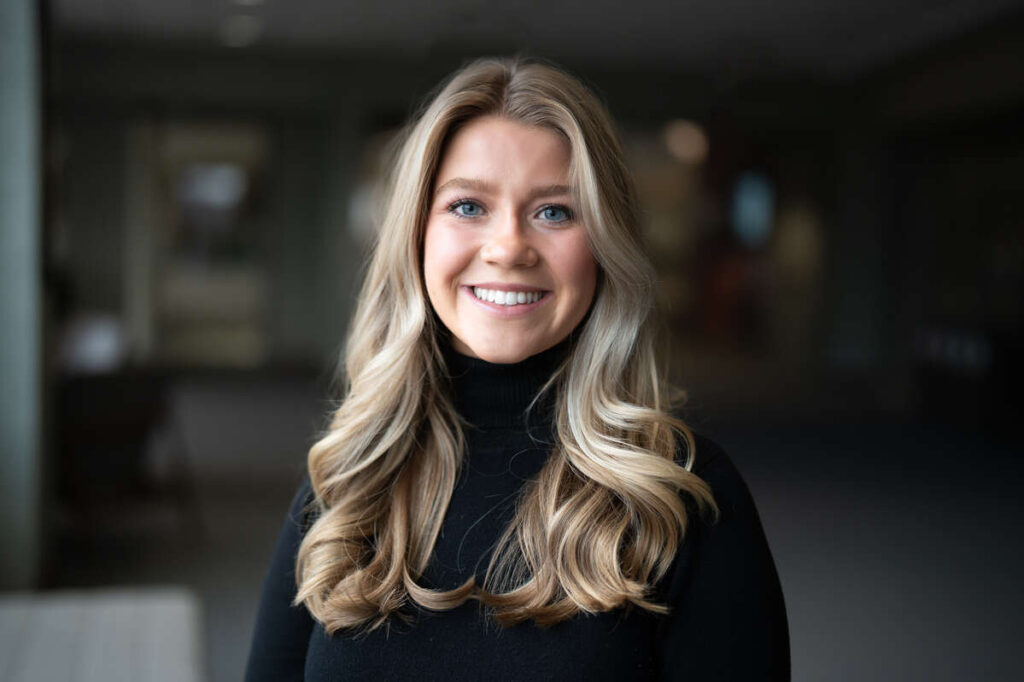Humans of St. Thomas introduces us to some of the incredible members of the St. Thomas community. Read about more of our fellow Tommies here.
Michael Stevens has a special fondness for squirrels and video games, listens to Japanese music and his middle school classmates voted him most likely to become a theologian.
Or so his relatively short bio section as president of the Theology Club told me. I was delightfully intrigued at the prospect of spending an hour or so in conversation with him to connect some of the dots of his personality.
When we did meet in person, I appreciated how easily and unselfconsciously he closed his eyes for bricks of time to contemplate his responses to a handful of my weightier questions. Stevens, a senior, answered me thoughtfully and with a thoroughness I don't encounter often, which made our hourlong talk truly interesting. I imagine those who are fortunate to enjoy a conversation with him find it time well spent.
Why do you think your young classmates voted you most likely to be a theologian? That seems unusual for someone in middle school!
Well, I went to a Catholic middle school and we took religion classes, so it might be a little more plausible. But I’m sure I showed some interest even at that level. It wasn’t until high school, though, that I realized how most Christians have a very childish understanding of their faith, as I did. I started reading Pope Benedict and other books to help me grow and understand it, and I wanted to take it further by being a theology major in college.
Have your career aspirations always included theology?
Probably in some regard. When I was a kid, since my father is a physician, I thought that I would be a doctor and an astronaut and an actor all in one. It didn’t quite pan out. But the thing is you have fairly limited options if you want to use a theology degree for a job. At this point, I don’t know where I might end up teaching, at the high school level or the university level, but I've never regretted my choice of a major, and I’m going onto graduate studies in theology. My quest for a better understanding of theology has not been exhausted yet.
Are you open to possibilities outside of teaching?
Since I was 10 I’ve done a lot of creative writing and work on it every day I can before I do my homework even, because I think of it as more important. I probably have several thousand pages worth of material at home. It may sound strange, but the creative writing may help me get an academic position at a university because open positions are so limited these days. They’re looking for someone who has something unusual to offer. And if you look at the theology faculty here, you’ll find that each one has something that’s a little bit unexpected that helps them contribute to the department in a unique way.
What do you read?
I prefer genre fiction. One of my favorite writers is Brandon Sanderson. He’s a fantasy writer who wrote a series of novels called Mistborn and a more recent series that’s really good.
Tell me about your penchant for video games.
I am a Sony faithful, so I play on PlayStation products. I have the PlayStation 4, which is the newest. I also play on PlayStation Vita, which is their mobile console. My favorite game series is Dark Souls. I've played all five games in the series, and I’ve beaten all five. Some more than once. It’s a Japanese game, which I tend to gravitate toward. Japanese role-playing games tend to be over the top and very stylized, although Dark Souls isn't that way. Most of the time in Japanese RPGs you're assigned one particular character to play – versus in Western role-playing games you make your own. And while personalizing your character is nice, it’s also a disadvantage because the writers have to account for every possible character a player could make, so there ends up being a sort of vagueness in the plot.
That must have taken a lot of time.
It did. I spent about 200 hours over a year or two on Dark Souls I.
Name one thing you’ve been meaning to do for awhile that you haven’t done.
I so desperately want to go to Japan. I originally wanted to study abroad in Japan last year. In the end, I chose Rome instead for various reasons. One thing is that Japanese is not very useful for theology because there aren’t many Japanese theologians in comparison to French or German or Italian or Spanish. So I went to Rome and I’m glad I did, but I still want to go to Japan. … And also as a Catholic, it can be difficult to get to the Sacraments if I stay there for any length of time because there are so few churches. There, this one church, though, at Sophia University where I was originally planning on studying abroad ... has Mass three times a day. So, if someday I’m able to go, I’m going to park myself right next to that church, then make excursions to other parts of the country.
Where does your interest in Japanese culture come from?
Like a lot of people my age, I grew up watching a lot of anime and Japanese shows and playing a lot of Japanese games. I have a particularly strong interest in them because of a few factors: When I was 8, I saw the film "Spirited Away" by Hayao Miyazaki that blew my world and introduced me to the beauty of Japanese animation. One of the nice things about animation is that it allows the creators to use a lot of fantastical elements without having to pay extra for CGI because it costs about the same amount to draw a dragon as it does to draw a human person. So I like that because I think one of the primary uses of entertainment like that is to pull us out of our drudgery and mundanity of day-to-day life. I find the fantastical elements are appealing in that regard. Like an anime. Believe me, most anime is garbage I would say, and that’s true of just about any medium because it’s difficult to make a work of art. But in anime, there’s generally a much higher preference of fantastical stories of one kind or another … it’s a kind of sci-fi or fantasy that doesn’t exist in the U.S.
Also the Japanese have a certain sense of aesthetics that’s appealing to me. If you think about a Japanese garden … with the Western garden everything is laid out and you have neat rows of plants and hedges and it’s all in geometric patterns. If you go to a Japanese garden you may not realize it’s a garden at first because everything is laid out in a way that seems very natural. And in reality, every one of those plants is laid out just as carefully as it would be in a Western garden. But because Japanese aesthetics has more of a focus on asymmetrical beauty than Western, it creates a more natural feeling.
I get the sense that you’re a fairly deliberate person.
Yes. All my life. I’ve always been a planner. I think that plays into having good reasoning skills because with me when it comes to making any decision of importance I like to lay out the pros and cons, make a decision and stick with it, because if you waiver afterward it usually doesn’t get you anywhere.
How do you spend your Sundays?
I don’t work at all on Sundays. Usually, after I go to Mass, I eat a nice big brunch at The View. I have my eggs and my hash browns and my pancakes and my muffin and my fruit. A little bit of fruit! Sunday is my day to splurge. Oh, and French toast – I can’t forget about French toast. Occasionally it’s burnt but usually it’s good. Then I go home and I play video games for a few hours, and I watch anime. Then I usually spend some time in the chapel in the afternoon. It’s nice because usually no one’s there so it’s quiet and private ... though there’s sort of this silence that hangs over the chapel and I like to pray aloud, I still don’t dare to break the silence even when I’m alone because it feels kind of sacred to a degree.
Do you have a favorite quote?
One phrase that comes to my mind is from Scripture. It's Paul’s famous line that “I can do all things in him who strengthens me.” When I went to Rome, that was a particularly difficult semester for me. I panicked when I first arrived because I had never lived in a foreign country before. I didn’t know the language, and the schoolwork was more difficult than a normal semester. So that was a great experience of learning to depend on God.
The other quote is just a fragment of a phrase from one of Brandon Sanderson's recent novels. One of the characters tells a story about … “Two men sat contemplating the end of an era.” That really struck me because it made me think about the ways in which our own era feels like an end to many trends and the beginning of many others. We’ve had a lot of ways in which the culture of the past has been rejected and there are new technological possibilities and new theological possibilities as well.







